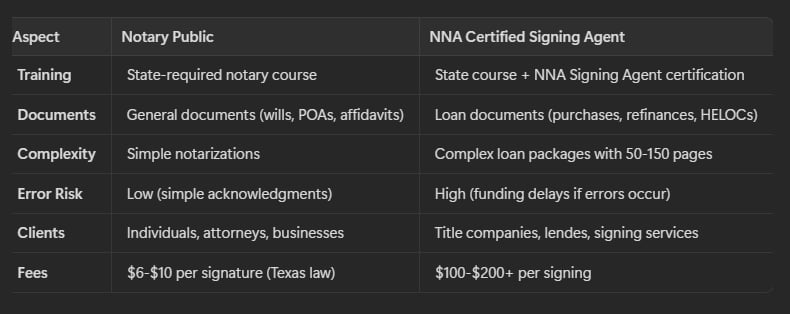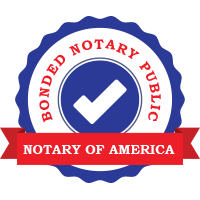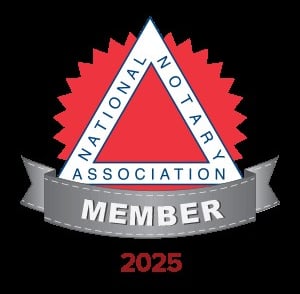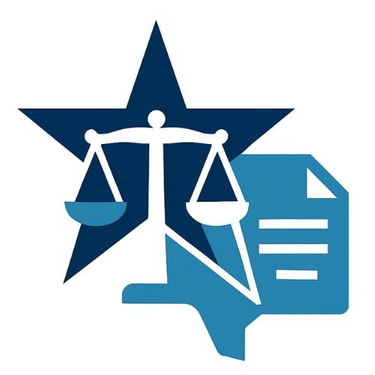What is the Difference Between a Notary and an NNA Certified Signing Agent in Texas?
Learn the key differences between a notary public and an NNA Certified Signing Agent in Texas. Understand why loan signings require specialized training and certification.
Maribel Lopez Hill
11/18/20253 min read


What is the Difference Between a Notary and an NNA Certified Signing Agent in Texas?
If you're preparing for a real estate closing or refinance, you may have heard the terms "notary public" and "signing agent" used interchangeably. While all signing agents are notaries, not all notaries are qualified to handle loan signings. Understanding the difference can help you ensure your closing goes smoothly and funds on time.
What is a Notary Public?
A notary public is an official appointed by the state of Texas to serve as an impartial witness to the signing of important documents. Notaries verify the identity of signers, ensure they are signing willingly and knowingly, and administer oaths when required. Common documents that require notarization include:
•Powers of attorney
•Wills and trusts
•Affidavits
•Business contracts
•Real estate deeds
In Texas, becoming a notary public requires completing a state-approved training course, passing an exam, and obtaining a commission from the Texas Secretary of State. The commission is valid for four years.
What is an NNA Certified Signing Agent?
An NNA Certified Signing Agent is a notary public who has received specialized training to handle loan document signings. The National Notary Association (NNA) provides this certification, which teaches notaries how to:
•Guide borrowers through complex loan packages
•Identify and correct common errors before they cause funding delays
•Understand the purpose of each document in a closing package
•Follow lender and title company instructions precisely
•Ensure documents are signed, dated, and initialed correctly
Loan signings involve dozens of documents, including the Closing Disclosure, Note, Deed of Trust, and Right to Cancel (for refinances). A single error—such as a missing initial or incorrect date—can delay funding by days or even weeks. This is why title companies and signing services specifically seek out NNA Certified Signing Agents for loan closings.
Key Differences at a Glance:
Why Experience Matters in Loan Signings
While certification is important, real-world experience is what separates good signing agents from great ones. As a Texas Broker-Realtor with 33 years of experience in real estate transactions, I bring a level of expertise that goes far beyond basic notary training. I understand the entire closing process, from contract to funding, which allows me to:
•Anticipate and prevent common errors
•Answer borrower questions with confidence
•Communicate effectively with title companies and lenders
•Ensure a smooth, stress-free signing experience
Do You Need an NNA Certified Signing Agent?
If you're involved in any of the following transactions, you should work with an NNA Certified Signing Agent:
•Home purchase
•Refinance (rate-and-term or cash-out)
•Home Equity Line of Credit (HELOC)
•Reverse mortgage
•Commercial real estate closing
•Seller-side closing
For general notarizations like powers of attorney, wills, or affidavits, a standard notary public is sufficient.
Frequently Asked Questions
Can any notary handle a loan signing?
Technically yes, but it's not recommended. Loan signings require specialized knowledge that most notaries don't have. Using an uncertified notary increases the risk of errors and funding delays.
How do I find an NNA Certified Signing Agent in Dallas-Fort Worth?
You can search the NNA's online directory, or you can contact Trusted Testimonies directly. I am NNA Certified, background-screened, and carry $100,000 E&O insurance.
What does "zero callbacks" mean?
A "callback" occurs when a signing agent makes an error that requires the borrower to re-sign documents. This delays funding and frustrates everyone involved. My 33 years of experience ensures zero callbacks—every signing is done right the first time.
Conclusion
The difference between a notary public and an NNA Certified Signing Agent comes down to training, experience, and specialization. While any notary can witness a signature, only a certified signing agent has the expertise to handle complex loan documents and ensure error-free closings. When your home purchase or refinance is on the line, choosing the right professional matters.
Need an NNA Certified Signing Agent in Dallas-Fort Worth? Contact Trusted Testimonies at (214) 903-0163 or Schedule Your Signing Online → CLICK HERE!
About the Author: Maribel Hill is an NNA Certified Signing Agent and Texas Notary Public with 33+ years of experience as a Broker-Realtor and 11+ years in mortgage lending. She serves the Dallas-Fort Worth metroplex with mobile notary, loan signing, and remote online notarization services nationwide. Bilingual (English/Spanish).


DWQs | NNA Certified Loan Signing Agent | Mobile & Online Notary
info@trustedtestimoniestx.com
English | Spanish
Notario Publico (No Abogado)
© 2025 Trusted Testimonies of Texas | All rights reserved.




